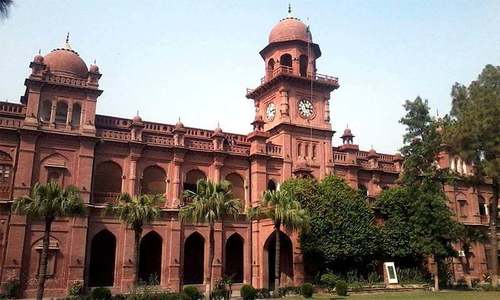THE spectacle of a former university vice chancellor and professors being dragged to court in chains has shamed the nation and raised questions about the draconian accountability drive under way. The public humiliation of academics under investigation for ‘illegal appointments’ highlights the roguish conduct of the country’s premier anti-graft body. It appeared that they were condemned even before being charged or proven guilty.
This may be the most outrageous, though not the first, such incident of a media trial conducted by the National Accountability Bureau that seems to have gone into overdrive in recent months. There have been numerous cases where politicians, senior government officials and businessmen have been administered shameful treatment while still under investigation. Under NAB laws they can be detained on mere allegations.
In some cases, the accused have been detained for months without charge to extract a confession from them and make them agree to a plea bargain. Such draconian measures have made the so-called accountability process questionable. It is not enough that NAB officials have regretted the chaining of the detained professors; the chief justice should have taken much sterner action against them. The court’s thunder and fury dissipated with the tendering of a faint apology.
By its action, NAB effectively declared the academics guilty. The onus is now on the accused to prove themselves innocent. They have now been remanded into NAB’s custody for further questioning. But their reputation would already have been stained by the media trial even if their innocence is proved.
The academics’ reputation would have been stained by the media trial even if their innocence is proved.
In the words of the chief justice: “It is like death for a professor if he is handcuffed as the impression cannot be undone for the rest of his life.” But still the matter was let go off without any punishment for those responsible for the humiliation of the detainees. The mild reprimand to arrogant NAB officers does not bring solace to wounded souls.
There are many other victims of NAB’s high-handedness. In light of some of the arrests, allegations of selective accountability and political victimisation have a ring of truth. It is certainly not coincidental that most of those targeted in the recent months belong to the opposition PML-N. It is true that many of them may have been involved in wrongdoing, but the way in which cases have been pursued against a selected few has made NAB’s actions open to criticism.
The sudden spurt in NAB’s operations raises suspicions of some ulterior motive. The recent arrest of Shahbaz Sharif without any formal charge is a case in point. There are many more serious cases of financial crime pending against other former public office holders but NAB has not evinced the same urgency as it has in the cases against PML-N leaders and officials linked to the previous government.
The arrest of the Punjab University professors may not have anything to do with those cases. But the incident has exposed the irrationality of the current accountability system, especially when it is argued that the matter should have been dealt with by the university syndicate or education ministry. It is quite intriguing why NAB should get involved in this case.
Surely corruption is a major problem sapping the economic and social progress of the country. But the flaws in the bureau’s operation are certainly not going to help the so-called anti-corruption campaign. Its sweeping authority has rendered the anti-graft body unaccountable.
In fact, there is a need to revisit all NAB laws that violate the basic norms of justice, making the body controversial. The very fact that NAB was established by a military government mainly as a tool against politicians makes it even more imperative to change the draconian laws guiding the anti graft institution. Although NAB is supposed to be an autonomous body, in effect it has never been so.
Established as a federal institution in 1999 by Pervez Musharraf’s military government, NAB is responsible not only for investigating financial crimes inside the government and outside but also for providing the government with critical intelligence assessment regarding economic terrorism. Its sphere of operation has been expanded subsequently. According to Musharraf, “NAB was created to put the fear of God in the corrupt”. But it was never to be.
Indeed, NAB initially did go after politicians and businessmen, but political expediency slowed down the anti-graft campaign. In many cases, investigations were stopped against politicians who agreed to align themselves with the military government. A former NAB chief publicly admitted that the cases against many leading politicians were withdrawn on the instructions of Gen Musharraf.
Most prominent among them were Aftab Sherpao and Faisal Saleh Hayat. The former PPP leaders, who faced serious corruption charges, later became key members of the PML-Q government. It was obvious that the anti-graft body became an instrument to be used against political rivals. That may still be true notwithstanding the claim of it being an independent and autonomous institution.
There is also a question mark over the competence of NAB to investigate white-collar crimes. True, the bureau has reportedly recovered billions of rupees of corruption money from businessmen, politicians and government and former military officials through a ‘plea bargain’ that allows it to negotiate out-of-court settlements. Under this provision, an accused is made to sign a confession and deposit funds of an amount determined by NAB. The accused can keep a part of the illegal money.
Former chief justice Jawwad S. Khawaja in 2015 described the practice of plea bargain as ‘institutionalised corruption’. There have also been reports of serious charges of corruption and misuse of power within NAB.
With such questionable credibility, NAB operations have become increasingly controversial. Therefore, it is imperative to overhaul the bureau, make it independent of political pressure, and remove its inhuman face that the incident of chaining and handcuffing of the academics exposed.
The writer is an author and journalist.
Twitter: @hidhussain
Published in Dawn, October 17th, 2018













































